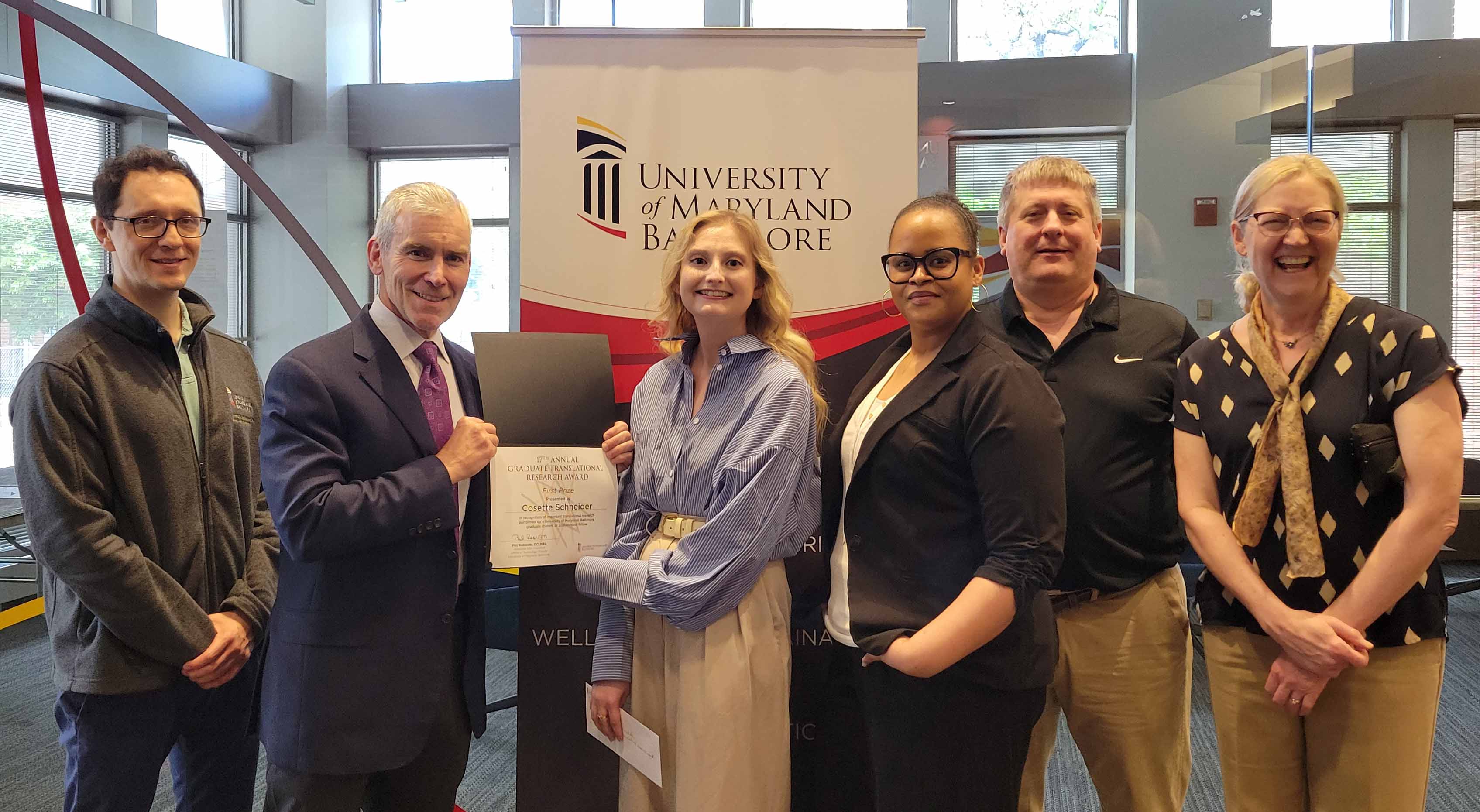UMSOM’s Cosette Schneider Awarded First Prize for 17th Annual Graduate Translational Research Award
July 03, 2025 Claire Murphy
Student’s project investigates how influenza neuraminidase, an enzyme with a critical role in the life cycle of influenza viruses, could potentially be used to develop a “universal” influenza vaccine.
Cosette Schneider, a PhD candidate in molecular microbiology and immunology at the University of Maryland School of Medicine (UMSOM), was awarded first prize for her submission in the 17th annual Graduate Translational Research competition. Schneider’s project, which is the basis of her PhD thesis research, investigates how influenza neuraminidase, an enzyme that plays a critical role in the life cycle of influenza viruses, could potentially be used to develop a “universal” influenza vaccine.
Part of ongoing work she is conducting in the lab of Lynda Coughlan, PhD, associate professor in the Department of Microbiology and Immunology at UMSOM, Schneider’s project combines her research interests with her desire to contribute to improving human health globally. Ultimately, she hopes her project will inform the development of improved vaccines and therapeutics for a virus of pandemic potential, which is especially critical given the increasing prevalence of avian influenza in the United States and globally.
Explaining her work, Schneider shared, “Ultimately, my thesis research aims to validate a broad panel of influenza neuraminidase constructs to identify lead vaccine candidates for incorporation into a universal influenza virus vaccine.
“I chose to study influenza neuraminidase using adenoviral vectors as a vaccine platform because efforts toward a more broadly protective, 'universal' influenza vaccine should prioritize the identification and targeting of broadly protective epitopes on novel antigens, as well as the evaluation of alternative vaccine platforms, which may improve breadth of protection,” she elaborated.
Vaccination is the most effective way to mitigate the significant public health threat that emerging influenza viruses pose. However, current seasonal vaccines elicit strain-specific immunity that does not protect against novel pandemic or emergent viruses, resulting in the need for annual vaccination and the rapid development of new vaccines against emerging strains of pandemic potential. Furthermore, current vaccines primarily target the major viral surface protein, hemagglutinin.
Understanding whether influenza neuraminidase can be used as an alternative target antigen could result in a more broadly protective, “universal” influenza vaccine. Better understanding what epitopes are targeted on neuraminidase and the mechanism of action of antibodies targeting them could improve our current understanding of neuraminidase-based immunity and how it can advance the design of a next-generation influenza vaccine for pandemic preparedness.
“I really enjoy that the project is always evolving in new and interesting directions, and that every day is an opportunity for learning,” Schneider explained. “However, I most enjoy developing vaccines and therapeutics for influenza because of their significant and wide-reaching impact on human health and because I firmly believe in the importance of preventative measures for infectious diseases and the role of vaccines as ‘weapons of mass protection.' "
Prior to beginning her PhD program at UMSOM, Schneider was an Oak Ridge Institute for Science and Education Fellow at the Walter Reed Army Institute of Research in the Malaria Biologics Branch. This experience helped her identify vaccine antigen and platform engineering as a primary area of interest when selecting a PhD thesis and lab. Her research expertise is in the development and preclinical testing of mRNA- and protein nanoparticle-based vaccines, and her research interests broadly are infectious disease vaccinology, protein chemistry, structural biology, and global health.
After completing her PhD, Schneider plans to pursue postdoctoral training in an academic lab focused on structural biology, antigen and vaccine platform engineering, and/or rational vaccine design with an emphasis on viruses of pandemic potential. In the long-term, she plans to combine her diverse interests as an independent investigator through the pursuit of advisory roles at international organizations where she can integrate scientific knowledge and global evidence to advise decision-making and negotiations that reduce the burden of infectious disease while strengthening relations between nations.
The Graduate Translational Research award, presented in conjunction with the University of Maryland School of Graduate Studies' annual Graduate Research Conference, recognizes the significant translational research conducted by a UMB graduate student or postdoctoral fellow. It embodies the mission of UM Ventures, Baltimore, which seeks to translate the outcomes of basic research into practical applications. This year’s expert judge panel included Mark Wozniak, PhD, MBA, director of licensing; Adam Kronk, MS, MBA, principal; Linda Petrillo, PhD, research and alliances officer; and Nancy Cowger, PhD, executive director of licensing and alliances.
“Our team found it very challenging to choose the winners this year,” Cowger said. “There were 13 highly qualified applicants from the Schools of Medicine, Pharmacy, and Dentistry, but ultimately, we were excited to give the first prize award to Cosette. She demonstrated innovation and dedication in pursuing her important vaccine research program.”
"We are thrilled to see Cosette receive this very well-deserved recognition for her outstanding research efforts. Cosette has really pioneered this project in our lab and has contributed valuable new knowledge and resources to our team,” Coughlan said. “Importantly, we hope that her work will have broader impact in helping translate neuraminidase-based influenza virus vaccines into humans.”